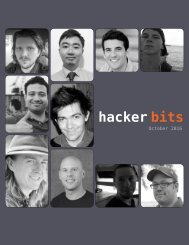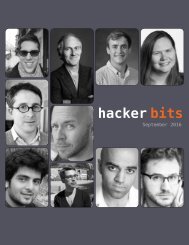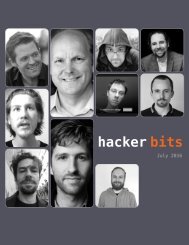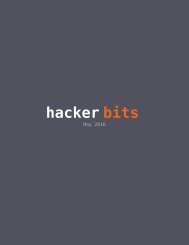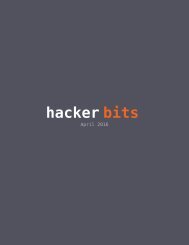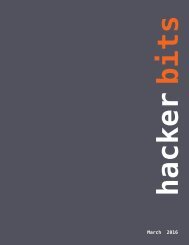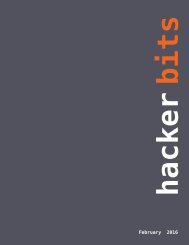Hacker Bits, August 2016
HACKER BITS is the monthly magazine that gives you the hottest technology stories crowdsourced by the readers of Hacker News. We select from the top voted stories and publish them in an easy-to-read magazine format. Get HACKER BITS delivered to your inbox every month! For more, visit https://hackerbits.com/2016-08.
HACKER BITS is the monthly magazine that gives you the hottest technology stories crowdsourced by the readers of Hacker News. We select from the top voted stories and publish them in an easy-to-read magazine format.
Get HACKER BITS delivered to your inbox every month! For more, visit https://hackerbits.com/2016-08.
Create successful ePaper yourself
Turn your PDF publications into a flip-book with our unique Google optimized e-Paper software.
zlib is now in widespread use<br />
for data transmission and<br />
storage.<br />
the individual entries in a .zip<br />
file.<br />
A .tar file would have to<br />
be decompressed and scanned<br />
from start to end in order to<br />
build a directory, which is how a<br />
.tar file is listed.<br />
Shortly after the introduction<br />
of gzip, around the mid-1990's,<br />
the same patent dispute called<br />
into question the free use of<br />
the .gif image format, which<br />
was very widely used on bulletin<br />
boards and the World Wide Web<br />
(a new thing at the time).<br />
So a small group created the<br />
PNG lossless compressed image<br />
format, with file type .png, to<br />
replace .gif. That format also<br />
uses the Deflate format for compression,<br />
which is applied after<br />
filters on the image data expose<br />
more of the redundancy.<br />
In order to promote widespread<br />
usage of the PNG format,<br />
two free code libraries were<br />
created. libpng and zlib. libpng<br />
handled all of the features of the<br />
PNG format, and zlib provided<br />
the compression and decompression<br />
code for use by libpng,<br />
as well as for other applications.<br />
zlib was adapted from the gzip<br />
code.<br />
All of the mentioned patents<br />
have since expired.<br />
The zlib library supports<br />
Deflate compression and decompression,<br />
and three kinds<br />
of wrapping around the Deflate<br />
streams. They are: no wrapping<br />
at all ("raw" Deflate); zlib wrapping,<br />
which is used in the PNG<br />
format data blocks; and gzip<br />
wrapping, to provide gzip routines<br />
for the programmer.<br />
The main difference between<br />
zlib and gzip wrapping is that<br />
the zlib wrapping is more compact,<br />
with six bytes vs. a minimum<br />
of 18 bytes for gzip, and<br />
the integrity check, Adler-32,<br />
runs faster than the CRC-32 that<br />
gzip uses.<br />
Raw Deflate is used by programs<br />
that read and write the<br />
.zip format, which is another<br />
format that wraps around deflate<br />
compressed data.<br />
zlib is now in widespread<br />
use for data transmission and<br />
storage. For example, most<br />
HTTP transactions by servers<br />
and browsers compress and decompress<br />
the data using zlib.<br />
Different implementations<br />
of Deflate can result in different<br />
compressed output for the same<br />
input data, as evidenced by the<br />
existence of selectable compression<br />
levels that allow trading off<br />
compression effectiveness for<br />
CPU time.<br />
zlib and PKZIP are not the<br />
only implementations of Deflate<br />
compression and decompression.<br />
Both the 7-Zip archiving<br />
utility and Google's zopfli library<br />
have the ability to use much<br />
more CPU time than zlib in order<br />
to squeeze out the last few bits<br />
possible when using the Deflate<br />
format, reducing compressed<br />
sizes by a few percent as compared<br />
to zlib's highest compression<br />
level.<br />
The pigz utility, a parallel<br />
implementation of gzip, includes<br />
the option to use zlib (compression<br />
levels 1-9) or zopfli (compression<br />
level 11), and somewhat<br />
mitigates the time impact<br />
of using zopfli by splitting the<br />
compression of large files over<br />
multiple processors and cores. •<br />
Reprinted with permission of the original author. First appeared at stackoverflow.com/questions/.<br />
hacker bits<br />
47








